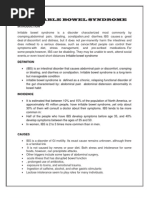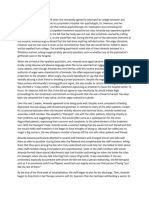Constipation 3
Constipation 3
Uploaded by
RomanCopyright:
Available Formats
Constipation 3
Constipation 3
Uploaded by
RomanCopyright
Available Formats
Share this document
Did you find this document useful?
Is this content inappropriate?
Copyright:
Available Formats
Constipation 3
Constipation 3
Uploaded by
RomanCopyright:
Available Formats
Constipation: Overview and Key Information
Constipation is a common gastrointestinal issue characterized by infrequent, difficult, or painful
bowel movements, often accompanied by a feeling of incomplete evacuation. It can affect
individuals of all ages, though it is most prevalent in children, the elderly, and individuals with a
sedentary lifestyle. While occasional constipation is common, chronic constipation can lead to
discomfort, bloating, and more serious complications if left untreated.
Causes of Constipation
Several factors can contribute to constipation, including:
1. Dietary Factors:
o Low fiber intake: A diet lacking in fiber, found in fruits, vegetables, and whole
grains, is a major contributor to constipation. Fiber helps add bulk to stool and
facilitates its movement through the intestines.
o Inadequate fluid intake: Insufficient hydration can lead to hard, dry stools that
are difficult to pass.
2. Lifestyle Factors:
o Physical inactivity: Lack of exercise can slow down the digestive system, leading
to constipation.
o Ignoring the urge to defecate: Frequently delaying or ignoring the urge to pass
stool can disrupt normal bowel function and lead to constipation.
3. Medications:
o Some medications, such as painkillers (especially opioids), antacids containing
aluminum or calcium, and certain antidepressants, can cause constipation as a side
effect.
4. Underlying Health Conditions:
o Irritable Bowel Syndrome (IBS) and hypothyroidism are conditions that can
lead to chronic constipation.
o Neurological disorders like Parkinson’s disease and multiple sclerosis can affect
the nerves that control bowel movements.
o Pregnancy can also cause constipation due to hormonal changes and pressure on
the intestines from the growing uterus.
5. Psychological Factors:
o Stress, anxiety, and depression can contribute to constipation by affecting normal
digestive function.
Symptoms of Constipation
The primary symptoms of constipation include:
Infrequent bowel movements (less than three times a week)
Straining during bowel movements
Hard, dry stools
Feeling of incomplete evacuation after a bowel movement
Abdominal discomfort or bloating
Management and Treatment
Treatment for constipation depends on its underlying cause and severity. Common approaches
include:
1. Dietary Changes:
o Increasing fiber intake through fruits, vegetables, and whole grains can help
soften stools and promote regular bowel movements.
o Drinking plenty of water and staying hydrated is essential for preventing
constipation.
2. Exercise:
o Regular physical activity can stimulate bowel movements and improve overall
digestive health.
3. Over-the-Counter Medications:
o Laxatives (e.g., fiber supplements, stool softeners, or osmotic laxatives like
polyethylene glycol) can provide relief, but should be used sparingly to avoid
dependence.
4. Behavioral Changes:
o Establishing a regular time for bowel movements, such as after meals, and
responding promptly to the urge to defecate can help prevent constipation.
5. Medical Treatment:
o If constipation is caused by an underlying condition, treating the condition may
help alleviate symptoms. For example, thyroid hormone replacement for
hypothyroidism or altering medications that cause constipation.
Prevention
Preventing constipation involves maintaining a healthy lifestyle:
Eat a fiber-rich diet: Aim for 25-30 grams of fiber daily.
Stay hydrated: Drink plenty of water throughout the day.
Exercise regularly: Aim for at least 30 minutes of physical activity most days of the
week.
Establish regular bowel habits: Set aside time each day for bowel movements and
respond to the urge promptly.
Conclusion
While constipation is a common issue, it can often be managed through lifestyle changes, dietary
adjustments, and regular physical activity. Persistent or severe constipation may indicate an
underlying health condition and should be addressed with a healthcare provider. With the right
approach, most people can achieve regular and comfortable bowel movements and prevent
complications from constipation.
You might also like
- Iatf 16949-2016 PDFDocument53 pagesIatf 16949-2016 PDFKaran Malhi100% (4)
- Unit 31: Open-Economy Macroeconomics: A) Appreciate, NominalDocument6 pagesUnit 31: Open-Economy Macroeconomics: A) Appreciate, NominalMinh Châu Tạ Thị100% (1)
- Ibs (Conceptmap)Document4 pagesIbs (Conceptmap)Carly Beth Caparida LangerasNo ratings yet
- Konstansi (Sembelit) Dan PenanganannnyaDocument4 pagesKonstansi (Sembelit) Dan PenanganannnyaAnanda AbdullahNo ratings yet
- ConstipationDocument7 pagesConstipationDurga100% (1)
- C&D FinalDocument31 pagesC&D Finaledilyntayer106No ratings yet
- Bowel Elimination ProblemsDocument69 pagesBowel Elimination ProblemsjonaNo ratings yet
- Constipation 508Document12 pagesConstipation 508Shishir Kumar SinghNo ratings yet
- Understanding ConstipationDocument10 pagesUnderstanding ConstipationAndy PurnomoNo ratings yet
- ConstipationDocument16 pagesConstipationOsama ALGabriNo ratings yet
- Gastrointestinal Problems: CausesDocument10 pagesGastrointestinal Problems: Causesmsah820No ratings yet
- Diarrhea and Constipation Understanding and Managing Digestive ChallengesDocument9 pagesDiarrhea and Constipation Understanding and Managing Digestive Challengesma202363082048No ratings yet
- Bowel EliminationDocument4 pagesBowel EliminationWarner Yague Pacariem Jr.No ratings yet
- Case Study On DiarrheaDocument4 pagesCase Study On DiarrheaDalene Erika GarbinNo ratings yet
- Eating DisordersDocument31 pagesEating DisorderskatNo ratings yet
- Anatomy and Physiology of The BowelDocument10 pagesAnatomy and Physiology of The BowelholzzNo ratings yet
- الجهاز الهضميDocument7 pagesالجهاز الهضميokokokkkNo ratings yet
- Chronic ConstipationDocument9 pagesChronic ConstipationAfnan MahmoodNo ratings yet
- Bulimia Nervosa: A. Overview B. Associated Nutritional ProblemsDocument6 pagesBulimia Nervosa: A. Overview B. Associated Nutritional ProblemsLorenzo AbijayNo ratings yet
- Biology 2 ProjectDocument5 pagesBiology 2 Projectaseel algamdiNo ratings yet
- Care of Patients With Bowel Problems (Autosaved)Document12 pagesCare of Patients With Bowel Problems (Autosaved)adeolaademayowa116No ratings yet
- Course Task Week 4Document3 pagesCourse Task Week 4Rose Ann100% (1)
- Presentation on Irritable Bowel Syndrome(IBS)Document12 pagesPresentation on Irritable Bowel Syndrome(IBS)SadekNo ratings yet
- The Complete Guide to Chronic Constipation: Symptoms, Risks, Treatments & CuresFrom EverandThe Complete Guide to Chronic Constipation: Symptoms, Risks, Treatments & CuresNo ratings yet
- ConstipationDocument1 pageConstipationNihar JawadinNo ratings yet
- Lecture 5 18.4.2023 Chapter 6Document51 pagesLecture 5 18.4.2023 Chapter 6hudabekawi42No ratings yet
- Dyspepsia: Kelompok: Radina Buamona Sri Antuke Fiska MaidaDocument8 pagesDyspepsia: Kelompok: Radina Buamona Sri Antuke Fiska MaidaWahyu ade putraNo ratings yet
- obesity projectDocument2 pagesobesity projectBRADLEY TIONG YEW SHING MoeNo ratings yet
- About Constipation KP LecDocument3 pagesAbout Constipation KP Lecgp.colacmedicalNo ratings yet
- DIARRHEADocument11 pagesDIARRHEAJae Xyrille GarcisoNo ratings yet
- Constipation Presentation Final Version 17.1.19Document14 pagesConstipation Presentation Final Version 17.1.19saidu mohammedNo ratings yet
- Bowel EliminationDocument6 pagesBowel EliminationMay Jovi JalaNo ratings yet
- Ha8 1Document31 pagesHa8 1ivmo.tabora.upNo ratings yet
- Lecture 15 Bowl EliminationDocument72 pagesLecture 15 Bowl EliminationIsbelNo ratings yet
- KONSTIPASIDocument33 pagesKONSTIPASIalhidayahNo ratings yet
- Case Study For Irritable Bowel SyndromeDocument4 pagesCase Study For Irritable Bowel SyndromeGabbii CincoNo ratings yet
- Irritable Bowel Syndrome: EsophagusDocument4 pagesIrritable Bowel Syndrome: EsophagusGebina Wahyu ArdinaNo ratings yet
- Irritable Bowel SyndromDocument7 pagesIrritable Bowel SyndromJosni Varghese0% (1)
- 22DYK2A10 5.1 ReportDocument3 pages22DYK2A10 5.1 Reportnguyenthanhbinh270403No ratings yet
- ConstipationDocument5 pagesConstipationkoreamydream85No ratings yet
- Constipation - PPT - Google SlidesDocument7 pagesConstipation - PPT - Google SlidesAyat RajpootNo ratings yet
- Common Ailments of The Digestive System 1. DiarrheaDocument13 pagesCommon Ailments of The Digestive System 1. DiarrheaCon AquinoNo ratings yet
- Common Digestive Disorder: Presented byDocument11 pagesCommon Digestive Disorder: Presented byRalph Reneal Baltazar CalapateNo ratings yet
- Common Ailments of The Digestive System 1. DiarrheaDocument13 pagesCommon Ailments of The Digestive System 1. DiarrheaSilvana María Espinoza CuadrosNo ratings yet
- Anorexia and BulimiaDocument4 pagesAnorexia and BulimiaSunny Dayanna Gelves BolañoNo ratings yet
- Constipation: How To Treat Constipation: How To Prevent Constipation: Along With Nutrition, Diet, And Exercise For ConstipationFrom EverandConstipation: How To Treat Constipation: How To Prevent Constipation: Along With Nutrition, Diet, And Exercise For ConstipationNo ratings yet
- Managing Chronic Constipation: A Patient GuideDocument9 pagesManaging Chronic Constipation: A Patient GuideAbhiyan Anala ArvindNo ratings yet
- Irritable Bowel Syndrome: EsophagusDocument4 pagesIrritable Bowel Syndrome: EsophagusbloodyluxNo ratings yet
- Bikash Kumar Sah 2 Semester PucmasDocument22 pagesBikash Kumar Sah 2 Semester PucmasBikash SahNo ratings yet
- Constipation: Constipation Fewer Than Three Bowel Movements Per WeekDocument8 pagesConstipation: Constipation Fewer Than Three Bowel Movements Per WeekIbrahim Abdullah100% (1)
- Copy of Diarrhea Understanding the Causes Symptoms and ManagementDocument8 pagesCopy of Diarrhea Understanding the Causes Symptoms and ManagementAahib NazirNo ratings yet
- Bloat To Bliss HandbookDocument9 pagesBloat To Bliss HandbookDrNicole BarssoumNo ratings yet
- Quick Tips To Get Rid of Bloating: Constipation Food AllergiesDocument15 pagesQuick Tips To Get Rid of Bloating: Constipation Food AllergiesLito PepitoNo ratings yet
- Constipation Presentation Final Version 17.1.19Document20 pagesConstipation Presentation Final Version 17.1.19karmen.kalajzic05No ratings yet
- Module 8 Eating and Sleep DisordersDocument36 pagesModule 8 Eating and Sleep DisordersCedric LosteNo ratings yet
- Constipation: Done Bye: Mariam DroubiDocument13 pagesConstipation: Done Bye: Mariam DroubiFares EL DeenNo ratings yet
- FiberDocument3 pagesFiberMinahil MehboobNo ratings yet
- Presentation on Irritable Bowel Syndrome(IBS) finalDocument10 pagesPresentation on Irritable Bowel Syndrome(IBS) finalSadekNo ratings yet
- Yogic Management of irritable bowel syndromeDocument13 pagesYogic Management of irritable bowel syndromebhardwajdeepti640No ratings yet
- The Complete Guide to Health: How to Improve Digestion and Boost Your Well-beingFrom EverandThe Complete Guide to Health: How to Improve Digestion and Boost Your Well-beingNo ratings yet
- 3 ConstipationDocument18 pages3 Constipationكسلان اكتب اسميNo ratings yet
- ABM 2Document2 pagesABM 2RomanNo ratings yet
- Diarrhea 4Document3 pagesDiarrhea 4RomanNo ratings yet
- Infantile Colic 1Document2 pagesInfantile Colic 1RomanNo ratings yet
- Otitis Media 1Document2 pagesOtitis Media 1RomanNo ratings yet
- Meningitis 3Document3 pagesMeningitis 3RomanNo ratings yet
- Iron Deficiency Anemia 2Document3 pagesIron Deficiency Anemia 2RomanNo ratings yet
- Croup 1Document3 pagesCroup 1RomanNo ratings yet
- 2Document4 pages2RomanNo ratings yet
- 1Document2 pages1RomanNo ratings yet
- 2Document3 pages2RomanNo ratings yet
- Melasma 1Document4 pagesMelasma 1Desya SilayaNo ratings yet
- 6S - 5S - Evaluation and Implementation Tool - LeanDocument8 pages6S - 5S - Evaluation and Implementation Tool - LeanShekhar RaviNo ratings yet
- Industrial Training at Lalit Ashok BangaloreDocument89 pagesIndustrial Training at Lalit Ashok BangaloreSatyaki Roy80% (5)
- Fieldguide To Toxic Plants in AustraliaDocument132 pagesFieldguide To Toxic Plants in AustraliaZnoishta NejadkayNo ratings yet
- 7 Alchemical StepsDocument6 pages7 Alchemical StepsCristina Pop100% (1)
- DM-Drainage Regulation-1Document1 pageDM-Drainage Regulation-1mhmdjdgmailcomNo ratings yet
- FOUNDATIONDocument5 pagesFOUNDATIONMOHAMED ZARIF SHAHRELNo ratings yet
- Brochure 4 Nursing Critical Care WorkshopDocument2 pagesBrochure 4 Nursing Critical Care WorkshopafflatuskolsNo ratings yet
- Blackbook Project On Insurance - 163417159-1Document90 pagesBlackbook Project On Insurance - 163417159-1LIBIN JOSENo ratings yet
- Process Synthesis 1 - IntroductionDocument30 pagesProcess Synthesis 1 - Introductionemartey62No ratings yet
- Soal ConjunctionDocument8 pagesSoal ConjunctionMuhammad Al-dheva PutraNo ratings yet
- Sheena and LJ PowerpointDocument20 pagesSheena and LJ PowerpointBryan Tracy PinpinNo ratings yet
- End-Stage Renal Disease Description of DiseaseDocument5 pagesEnd-Stage Renal Disease Description of DiseaseZhailyn Joy DumlaoNo ratings yet
- Counselling As A ProcessDocument2 pagesCounselling As A ProcessTata Duero LachicaNo ratings yet
- Kinesiology of Movements: Understanding Planes and Axes of MovementDocument3 pagesKinesiology of Movements: Understanding Planes and Axes of MovementTessa Kaye - Rumol AlfaroNo ratings yet
- Process Measurement and Control: Enraf Small Volume Prover Specifications Worksheet Rev VDocument6 pagesProcess Measurement and Control: Enraf Small Volume Prover Specifications Worksheet Rev VadjiNo ratings yet
- PancreatitisDocument12 pagesPancreatitisjhodane100% (4)
- Ecosphere - 2019 - Bengtsson - Grasslands More Important For Ecosystem Services Than You Might Think PDFDocument20 pagesEcosphere - 2019 - Bengtsson - Grasslands More Important For Ecosystem Services Than You Might Think PDFRahul ChavaliNo ratings yet
- HaematologyDocument11 pagesHaematologyIkram AzmanNo ratings yet
- Maxstar 200 Spec SheetDocument8 pagesMaxstar 200 Spec SheetAlief PambudhiNo ratings yet
- Blood Circulation Around The BodyDocument8 pagesBlood Circulation Around The Bodysama ahmedNo ratings yet
- Impact of Corona Virus in Indian Economy and Banking Sector - An Over ViewDocument12 pagesImpact of Corona Virus in Indian Economy and Banking Sector - An Over ViewAnirban HembramNo ratings yet
- GangreneDocument10 pagesGangreneawtshfhdNo ratings yet
- Synthesis and Optical Properties of Copper Nanoparticles Prepared by A Chemical Reduction MethodDocument13 pagesSynthesis and Optical Properties of Copper Nanoparticles Prepared by A Chemical Reduction MethodFahad KhalidNo ratings yet
- Anti-Ragging Committee For The Academic Year 2015 - 16: Ug Wing, Afmc PuneDocument4 pagesAnti-Ragging Committee For The Academic Year 2015 - 16: Ug Wing, Afmc PuneDeepak RanjanNo ratings yet
- Accounting Bridging Class Special ExamDocument6 pagesAccounting Bridging Class Special ExamJohn Rey Bantay Rodriguez100% (1)
- SketchyDocument3 pagesSketchybellNo ratings yet
- Case Assignment #2Document5 pagesCase Assignment #2aykeem.youngbloodNo ratings yet



































































































